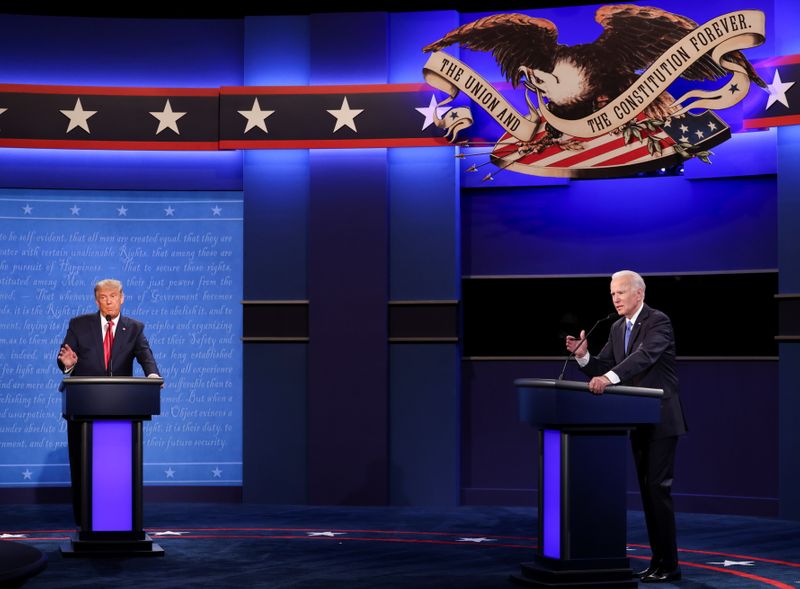By Chris Kahn
(Reuters) - Democrat Joe Biden's lead over U.S. President Donald Trump has widened a little in the final days of the 2020 campaign in three critical Rust Belt states that Trump narrowly won four years ago, according to Reuters/Ipsos opinion polls released Sunday.
Biden leads Trump by 10 percentage points in Wisconsin and Michigan, and the presidential nominee is ahead by seven points in Pennsylvania. Biden has led Trump in all three states in every Reuters/Ipsos weekly poll that began in mid-September, and his leads have ticked higher in the each state over the past two weeks.
Reuters/Ipsos is polling likely voters in six states - Wisconsin, Pennsylvania, Michigan, North Carolina, Florida and Arizona - that will play critical roles in deciding whether Trump wins a second term in office or if Biden ousts him.
Below is a state-by-state look at Reuters/Ipsos findings, based on the online responses of likely voters:
MICHIGAN (Oct. 27 - Nov. 1):
* Voting for Biden: 52%
* Voting for Trump: 42%
* Biden was up 52%-43% the prior week.
* 37% of adults said they already had voted.
* 52% said Biden would be better at handling the coronavirus pandemic. 40% said Trump would be better.
* 48% said Trump would be better at managing the economy. 44% said Biden would be better.
WISCONSIN (Oct. 27 - Nov. 1):
* Voting for Biden: 53%
* Voting for Trump: 43%
* Biden was up 53%-44% the prior week.
* 41% of adults said they already had voted.
* 52% said Biden would be better at handling the coronavirus pandemic. 38% said Trump would be better.
* 47% said Trump would be better at managing the economy. 45% said Biden would be better.
PENNSYLVANIA (Oct. 27 - Nov. 1):
* Voting for Biden: 51%
* Voting for Trump: 44%
* Biden was up 50%-45% the prior week.
* 25% of adults said they already had voted.
* 51% said Biden would be better at handling the coronavirus pandemic. 40% said Trump would be better.
* 48% said Trump would be better at managing the economy. 46% said Biden would be better.
FLORIDA (Oct. 21 - Oct. 27)
* Voting for Biden: 49%
* Voting for Trump: 47%
* A prior poll had showed Biden with an apparent lead of 50%-46%, with the margin being on the edge of the poll's credibility interval.
* 32% said they already had voted.
* 48% said Biden would be better at handling the coronavirus pandemic. 42% said Trump would be better.
* 52% said Trump would be better at managing the economy. 41% said Biden would be better.
ARIZONA (Oct. 21 - Oct. 27):
* Voting for Biden: 48%
* Voting for Trump: 46%
* The two are statistically tied as the margin is within the survey's credibility interval.
* A prior poll also showed a statistically even race, with 49% for Biden and 46% for Trump.
* 37% said they already had voted.
* 50% said Biden would be better at handling the coronavirus pandemic. 42% said Trump would be better.
* 50% said Trump would be better at managing the economy. 44% said Biden would be better.
NORTH CAROLINA (Oct. 21 - Oct. 27):
* Voting for Biden: 49%
* Voting for Trump: 48%
* Since the margin is within the poll's credibility interval, the race is statistically tied, as it was in the prior poll when Biden had 49% to Trump's 46%.
* 35% said they already had voted.
* 48% said Biden would be better at handling the coronavirus pandemic. 44% said Trump would be better.
* 51% said Trump would be better at managing the economy. 43% said Biden would be better.
NOTES
The Reuters/Ipsos opinion polls are conducted online in all six states in English, as well as in Spanish in Arizona and Florida.
* In Michigan, from Oct. 27 to Nov. 1, it gathered responses from 1,007 adults, including 654 likely voters, and had a credibility interval of 4 percentage points.
* In Wisconsin, from Oct. 27 to Nov. 1, it gathered responses from 1,007 adults, including 696 likely voters, and had a credibility interval of 4 percentage points.
* In Pennsylvania, from Oct. 27 to Nov. 1, it gathered responses from 1,006 adults, including 673 likely voters, and had a credibility interval of 4 percentage points.
* In Florida, from Oct. 21 to Oct. 27, it gathered responses from 1,006 adults, including 704 likely voters, and had a credibility interval of 4 percentage points.
* In Arizona, from Oct. 21 to Oct. 27, it gathered responses from 1,007 adults, including 714 likely voters, and had a credibility interval of 4 percentage points.

* In North Carolina, from Oct. 21 to Oct. 27, it gathered responses from 1,006 adults, including 647 likely voters, and had a credibility interval of 4 percentage points.